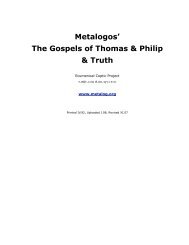Andrew Louth - Syriac Christian Church
Andrew Louth - Syriac Christian Church
Andrew Louth - Syriac Christian Church
Create successful ePaper yourself
Turn your PDF publications into a flip-book with our unique Google optimized e-Paper software.
LETTER 2: ON LOVE<br />
1 There is a French translation of this letter in Dalmais (1948), but I have<br />
not been able to consult it.<br />
2 Cf. Rom. 13:10 and Matt. 22:40.<br />
3 The incensive power.<br />
4 ‘That which is within our power’ (to eph’ êmin): see Amb. 10, n. 122.<br />
5 Gnômê.<br />
6 Maximus was later, during the Monothelite controversy, to retract this<br />
way of putting the unity of will and inclination between God and the<br />
saints: see Opusc. 1:33A, where he retracts his reference to ‘one activity<br />
of God and those worthy of God’ (Amb. 7:1076C).<br />
7 stoicheion: element or principle.<br />
8 One of the ‘Chalcedonian’ adverbs.<br />
9 Logos and tropos.<br />
10 This paragraph seems to be based on the idea, found in Philo, that the<br />
name Abraham means ‘elect father of sound’, signifying the good man’s<br />
reasoning: see below Amb. 10.45 and n. 126.<br />
11 This way of seeing virtue as a life in accordance with nature, or with the<br />
logos, is typically Stoic, and Maximus’ language here has other Stoic<br />
echoes.<br />
12 I.e., he led other human beings, viz. Sarah and the rest of his household,<br />
as he led himself, since they all possess the same human nature.<br />
13 ‘Things that are after God’: after, that is, in the scale of being. It is a<br />
Neoplatonic use, which in <strong>Christian</strong> (Maximian) metaphysics has the<br />
radical meaning of ‘created beings’.<br />
14 Cf. Luke 10:27 (not exact, the first part is much closer to Deut. 6:5).<br />
15 Cf. John 14:6.<br />
16 Cf. John 10:9, together with Heb. 9:11–12.<br />
17 Cf. John 15:1, together with Rom. 11:17 (though Maximus does not use<br />
the more appropriate language of grafting from Romans).<br />
18 One of the ‘Chalcedonian’ adverbs.<br />
19 1 John 4:8.<br />
20 Cf Matt. 13:22 and parallels (parable of the Sower). Maximus may,<br />
however, have in mind (since he speaks of the thorns planted ‘from the<br />
beginning’) the immediately following parable of the Tares (Matt. 13:24–<br />
30), even though he speaks of thorns rather than tares.<br />
21 Theosophia: a word first found in Porphyry (who quotes an earlier use),<br />
popular among the Neoplatonists, and also used by Denys the<br />
Areopagite (e.g., Mystical Theology I.1:997A).<br />
22 The Septuagint reads ‘book’.<br />
23 A cento from Jeremiah: Baruch 4:1–4, 3:14, Jer. 38 [Heb: 31]: 3–4, 6:16.<br />
24 A cento composed of: Bar. 5:1–2, spliced with Eph. 4:22 and Col. 3:10.<br />
DIFFICULTY 10<br />
1 See chapter 5 of the Introduction.<br />
NOTES 203




